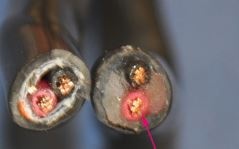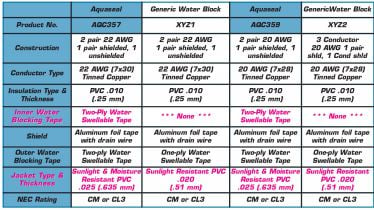With the communication industry consistently growing, it is best to be prepared for any environmental factors. From direct sunlight factors to wet locations, a reliable connection cannot afford to be overlooked.
For those locations; the industry’s original water resistant, water blocking low-voltage cable- Aquaseal cable, has become the recognized name for indoor/outdoor applications.
What is considered a Wet Location?
Wet locations occur in areas where direct burial in the ground, in conduit that is located below grade or any time the cable is passing through the concrete slab. These are areas where water, humidity or liquid saturation is possible- regions that are regularly exposed to the elements.
So how does it work?
Aquaseal low-voltage cable consists of a 2-ply tape on the inner shielded pairs which is virtually impenetrable. As well as a .025 inch sunlight resistant and moisture resistant jacket. Aquaseal contains this material, so when the water penetrates the cable, the 2-ply tape expands to protect the cables and connections.

Advantage of West Penn Wire’s Aquaseal cable versus the competitor:
- 2-ply tape material immediately expands to absorb any type of moisture to 10 mm within the first minute
- Expands to 12 mm after ten minutes
- Each cable contains the maximum amount of tapes.
- Competitors: 1-sided ply tape allows for water to immerse through the cable and won’t flush it out.
Why is Aquaseal the better choice?
- A single ply tape has the potential to wash away, while 2-ply tape contains and maintains the absorption rate at a particular point and the communications will not be interrupted.

What is the difference between In-conduit (AQC) and Direct Burial (AQ):
- In-conduit (AQC): Any low-voltage cable with a gauge size of less than 18 will not pass the UL crush test, therefore these types of cables are required to be put into conduit if they will be installed in the ground.
- Direct Burial (AQ): A nylon coating is extruded (not hydroscopic) over the PVC compound. This makes the conductors abrasive and resistant to water passing through it. Most PVCs are hydroscopic and will let water filter through it to help with other electrical and mechanical factors. The nylon also acts as a stiffening agent and will not allow the conductors to crush one another during the crush test procedure (Direct Burial test).
Would like to see the product for yourself? Come visit us at InfoComm in Orlando, Florida from June 14-16 at booth #3755!



